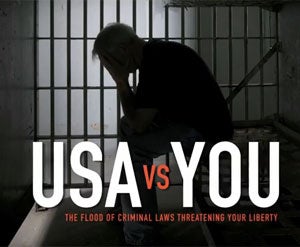USA vs. YOU: Heritage Expert Testifies on Overcriminalization
Josh Shepherd / Morgan Bennett /
 Even Congress doesn’t know how many federal crimes there are — that was the implication at a recent hearing focused on overcriminalization.
Even Congress doesn’t know how many federal crimes there are — that was the implication at a recent hearing focused on overcriminalization.
This past Friday, June 14, the House’s new bipartisan Over-Criminalization Task Force held its first hearing, which was focused on “defining the problem and scope of over-criminalization and over-federalization.”
John Malcolm of The Heritage Foundation was one of four expert witnesses, all of whom suggested that Congress enact two essential “plugs” that would both minimize the harms of overcriminalization and prevent future laws from adding to the problem:
First, Congress should pass a law that requires proof of a criminal mental state in order for an accused to be convicted of a crime. In other words, prosecutors would be required to prove that the accused individual knew (or should have known) that his action or behavior was illegal. A mens rea (“guilty mind”) would be a default requirement for all crimes unless Congress clearly states an intent to create a “strict liability” crime, which does not require proof of a blameworthy intent.
Second, if an act is serious enough to impose criminal penalties on an American citizen, it should be Congress, instead of unelected bureaucrats in federal agencies, that should draft, vote on, and pass such laws.
Malcolm, pointing out the vast number of federal crimes (approximately 4,500 statutes and over 300,000 regulatory crimes), further suggested that Congress should pass a law requiring the government to identify every federal statute and regulation that contains a criminal provision and post it in a manner that is easily accessible to the public without charge.
When the Task Force asked the Congressional Research Service (CRS) to find out exactly how many federal crimes existed, the CRS responded that they simply did not have the manpower to take on such a gargantuan task. Everyone at the hearing knew the implication: If Congress can’t figure out how many federal crimes there are, there is no way an average American would know what is, and what is not, a crime.
One of the most energizing aspects of the criminal law reform movement is its bipartisan nature. For instance, Malcolm, who supervises The Heritage Foundation’s Overcriminalization Project, leads an overcriminalization working group that consists of such diverse organizations as the ACLU, the Cato Institute, the National Association of Criminal Defense Lawyers, the Federalist Society, and Families Against Mandatory Minimums.
A similar bipartisan spirit was evident at the hearing: At one point, Representative Karen Bass (D–CA) held up a copy of The Heritage Foundation’s recent publication USA vs. YOU and stated that she was “really encouraged by the diversity of the organizations that have come together around looking at the issue of overcriminalization.”
Several members of the Task Force highlighted Heritage’s overcriminalization case studies to show how the issue affects real Americans. To explore these documented true stories of overcriminalization, get a free downloadable copy of our new short booklet USA vs. YOU.
Morgan Bennett is currently a member of the Young Leaders Program at The Heritage Foundation. For more information on interning at Heritage, please click here.
